MSc in Energy Policy
advertisement
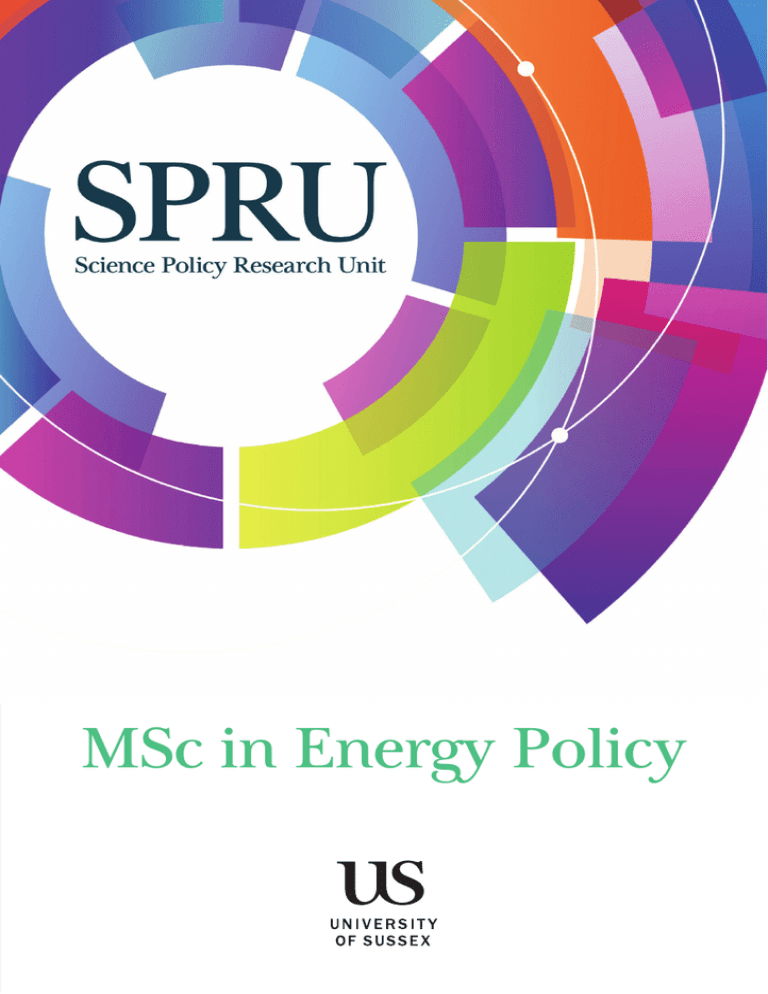
MSc in Energy Policy MSc in Energy Policy Our current energy systems face mounting economic, social and environmental pressures and must change radically and quickly if the world is to avoid dangerous climate change. Creating sustainable energy systems will be a defining challenge for humanity in the 21st century and one that requires professionals who fully appreciate the technological, economic and political dimensions of this challenge. This course provides a broad-based, social scientific training in energy and climate policy, focusing in particular on the role of technological innovation. Our approach is interdisciplinary, practical and applied, providing you with the skills to analyse policy problems and to propose and evaluate viable policy solutions. This MSc is unique in combining ideas from economics, innovation studies and policy studies while requiring no prior training in these fields. The course will allow you explore the opportunities, challenges and constraints in creating sustainable and low-carbon energy systems. You will investigate real-world policy problems in a range of countries, engage with concepts and debates from a number of disciplines, and draw on the latest research and practice. WHY STUDY ENERGY POLICY AT S U S S E X ? Sussex is renowned for its agenda setting, interdisciplinary teaching and research in science, technology and development studies. You will be taught by leading researchers in the field who regularly advise public, private and nongovernmental organisations. EXPERTISE OF COURSE CONVENORS Benjamin Sovacool – energy security, energy justice, renewable energy, energy policy Steven Sorrell – energy economics, energy efficiency, climate policy Florian Kern – governing energy transitions, low carbon innovation policy Robert Byrne – low carbon development, renewable energy, energy transitions Karoline Rogge – climate policy, eco-innovation, ecological economics, energy transitions COURSE CONTENT Autumn term • Introduction to Energy Policy • Policy Making and Policy Analysis • Science, Technology and Innovation: Markets, Firms and Policies Spring term • Perspectives, Methods and Skills And one of the following: • Introduction to Statistical Research Methods • Multivariate Analysis You also chose two modules from: • Energy and Development • Energy Policy and Sustainability • Governing Energy Transitions • Innovation for Sustainability • Management of Risk • Governing and Using Technology for Development • Network Analysis and Infographics Summer Term • Supervised work on a 20,000 word research-based dissertation Studying at SPRU With students from all over the world, our courses provide aspiring professionals with the knowledge and skills to analyse and guide policy, and to manage scientific change and technological innovation. Our courses put graduates in a strong position to shape future developments in their field. Teaching is via small, highly interactive lectures and seminars that foster a culture of knowledge sharing, ideas generation, critical thinking and enthusiastic debate. Discussion often continues long after teaching has finished. SPRU students come from a range of academic backgrounds and are ambitious to achieve in their chosen specialisms. What makes them special is their open-mindedness, curiosity and desire for knowledge – and their interest in tackling some of the major challenges facing the world. SPRU HISTORY Founded in 1966 by Christopher Freeman, SPRU was one of the first interdisciplinary research centres in the field of science and technology policy and management, and continues to be internationally recognised as a leading centre in this field. Today, with over 50 faculty members, SPRU is at the forefront of new ideas, problemoriented research, inspiring teaching, and creative, high impact engagement with decision makers across government, business and civil society. WORK EXPERIENCE OPPORTUNITIES As part of their dissertation research, students may have the opportunity to gain work experience in policy institutions, firms, government departments, not-for-profit and non-governmental organisations. A V A R I E T Y O F W AY S T O L E A R N AND ENGAGE We encourage interaction, collaboration and creativity. You are invited to participate in SPRU’s extensive and wide-ranging programme of research seminars as well as a variety of conferences and workshops. Working closely with our academics, you will also have the opportunity to learn and contribute directly to SPRU research as part of your training. ENTRY REQUIREMENTS UK A first or second class (2.1 or 2.2) undergraduate honours degree in either a social or natural science. Applicants with relevant professional experience will also be considered. Overseas Please refer to www.sussex.ac.uk/spru/eps for a list of entry requirements by country. Fees and funding Please refer to www.sussex.ac.uk/spru/eps CAREERS SPRU graduates have been successful in obtaining employment in a variety of roles within the public, private and not-for-profit sectors. For example, recent MSc graduates have gained employment in international organisations, government departments, local authorities, the private sector and NGOs, while others have gone on to study for PhDs in this area. CONNECT WITH US Our alumni say We would be interested to hear from academics and non-academic organisations interested in finding out more about our work. We can to and study in Energy Policy for Sustainability collaborate“Ionchose both short long the term MSc projects learn howasthe design of economic, energy and take partto in consortiums well appropriate as host environmental visitingand academics. We can providepolicies evidence- can promote long-term sustainability, while also meeting needs oftothe present. The faculty at SPRU are based expertise on a range of issues related infrastructure governance andwith policy.other universities, government agencies and well-connected think tanks providing me with a number of avenues through which my dissertation. With this MSc I am better equipped to Let’s connect! influence, inspire, educate and negotiate more effectively in order to address the need to transition to sustainable energy systems.” E Ralitsa Hiteva: R.Hiteva@sussex.ac.uk C O N TA T toCpursue T +44 (0)1273 877201 CAMERON JONES 2013 S U S TA I N A B L E E L E C T R I C I T Y A N A LY S T, D E PA R T M E N T O F E N E R G Y, A L B E R TA , C A N A D A @SPRU V I S I T www.sussex.ac.uk/spru/infrastructure “I chose the MSc in Energy Policy for Sustainability at Sussex because I wanted to deepen my knowledge of renewable energies and the energy system in general. In addition, I also obtained new insights into different fields of studies related to economics and innovation. The inter-disciplinarity of the course and the international background of the students make it a great and fruitful experience.” PA U L A R O L F F S 2 0 1 3 R E S E A R C H E R W I T H I N T E R N AT I O N A L C L I M AT E F I N A N C E P R O G R A M M E , E 3 G C O N S U LTA N C Y, U K “Not only have I gained tremendous knowledge but I understand how to operationalize energy policy instruments and strategies to effectively achieve the desired outcomes. Taking the Energy Policy course at SPRU is something I strongly recommend to anyone; you only have to be passionate about understanding our energy systems, making energy services more accessible and efficient, and keeping our environment and world, safe from climate change impacts.” AKACHUKWU OKAFOR 2015 E N E R G Y P O L I C Y A N A LY S T & F O U N D E R , F LO R E O E N E R G Y, N I G E R I A www.sussex.ac.uk/spru/eps
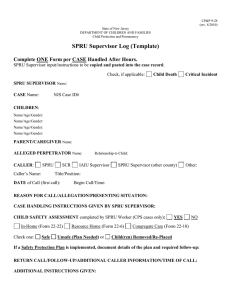
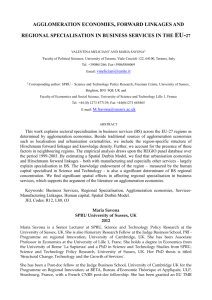
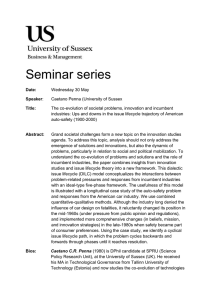
![Prof Jim Skea abstract and bio [DOCX 11.61KB]](http://s2.studylib.net/store/data/015015010_1-36608292abe33ff183c3888f45090b3d-300x300.png)
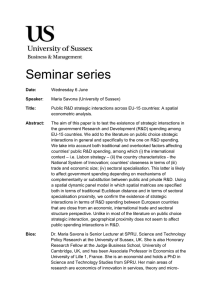
![Science Ajar: PowerPoint presentation [PPTX 17.33MB]](http://s2.studylib.net/store/data/015014990_1-0bc759a31ae2aea6ef5c7dc9b92481c2-300x300.png)